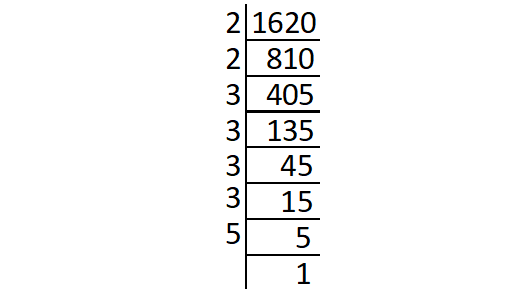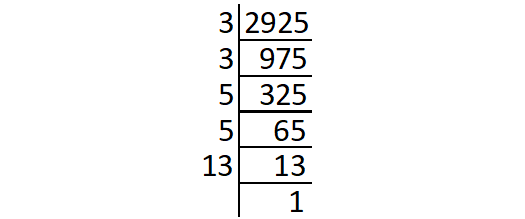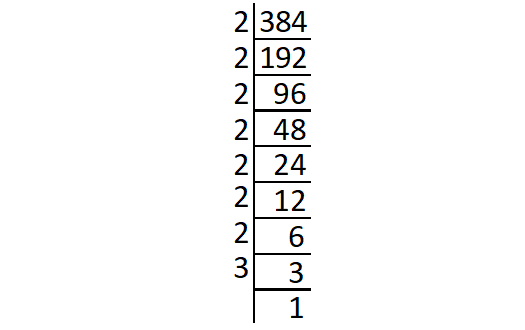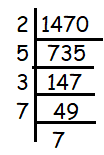FIND THE LEAST NUMBER SHOULD BE DIVIDED TO GET A PERFECT SQUARE
Subscribe to our ▶️ YouTube channel 🔴 for the latest videos, updates, and tips.
The following steps will be useful to find the least number by which the given number has to be divided to get a perfect square.
Step 1 :
Decompose the given numbers into its prime factors.
Step 2 :
Write the prime factors as pairs such that each pair has two same prime factors.
Step 3 :
Find the prime factor which does not occur in pair. That is the least number by which the given number has to be divided to get a perfect square.
Example 1 :
Find the least number multiplied by 200 to get a perfect square.
Solution :
Decompose 200 into its prime factors.

Prime factors of 200 :
200 = 2 ⋅ 2 ⋅ 2 ⋅ 5 ⋅ 5
= (2 ⋅ 2) ⋅ 2 ⋅ (5 ⋅ 5)
The prime factor 2 does not occur in pair.
So, '2' is the least number by which 200 has to be divided to get a perfect square.
Justification :
√(200/2) = √[(2 ⋅ 2 ⋅ 2 ⋅ 5 ⋅ 5)/2]
√100 = √(2 ⋅ 2 ⋅ 5 ⋅ 5)
= 2 ⋅ 5
= 10
Further,
200/2 = 100 = 102
Example 2 :
Find the least number by which 252 has to be divided to get a perfect square.
Solution :
Decompose 252 into its prime factors.

Prime factors of 252 :
252 = 2 ⋅ 2 ⋅ 3 ⋅ 3 ⋅ 7
= (2 ⋅ 2) ⋅ (3 ⋅ 3) ⋅ 7
The prime factor 7 does not occur in pair.
So, '7' is the least number by which 252 has to divided to get a perfect square.
Justification :
√(252/7) = √[(2 ⋅ 2 ⋅ 3 ⋅ 3 ⋅ 7)/7]
√36 = √(2 ⋅ 2 ⋅ 3 ⋅ 3)
= 2 ⋅ 3
= 6
Further,
252/7 = 36 = 62
Example 3 :
Find the least number multiplied by 1620 to get a perfect square.
Solution :
Decompose 1620 into its prime factors.

Prime factors of 1620 :
1620 = 2 ⋅ 2 ⋅ 3 ⋅ 3 ⋅ 3 ⋅ 3 ⋅ 5
= (2 ⋅ 2) ⋅ (3 ⋅ 3) ⋅ (3 ⋅ 3) ⋅ 5
The prime factor 5 does not occur in pair.
So, '5' is the least number to be multiplied by 180 to get a perfect square.
Justification :
√(1620/5) = √[(2 ⋅ 2 ⋅ 3 ⋅ 3 ⋅ 3 ⋅ 3 ⋅ 5)/5]
√324 = √(2 ⋅ 2 ⋅ 3 ⋅ 3 ⋅ 3 ⋅ 3)
= 2 ⋅ 3 ⋅ 3
= 18
Further,
1620/5 = 324 = 182
Example 4 :
Find the least number multiplied by 2925 to get a perfect square.
Solution :
Decompose 2925 into its prime factors.

Prime factors of 2925 :
2925 = 3 ⋅ 3 ⋅ 5 ⋅ 5 ⋅ 13
= (3 ⋅ 3) ⋅ (3 ⋅ 3) ⋅ 13
The prime factor 13 does not occur in pair.
So, '13' is the least number by which 2925 has to be divided to get a perfect square.
Justification :
√(2925/13) = √[(3 ⋅ 3 ⋅ 5 ⋅ 5 ⋅ 13)/13]
√225 = √(3 ⋅ 3 ⋅ 5 ⋅ 5)
= 3 ⋅ 5
= 15
Further,
2925/5 = 225 = 152
Example 5 :
Find the least number multiplied by 384 to get a perfect square.
Solution :
Decompose 384 into its prime factors.

Prime factors of 384 :
384 = 2 ⋅ 2 ⋅ 2 ⋅ 2 ⋅ 2 ⋅ 2 ⋅ 2 ⋅ 3
= (2 ⋅ 2) ⋅ (2 ⋅ 2) ⋅ (2 ⋅ 2) ⋅ 2 ⋅ 3
The prime factors 2 and 3 do not occur in pair.
Product of 2 and 3 :
2 ⋅ 3 = 6
So, '6' is the least number by which 384 has to be divided to get a perfect square.
Justification :
√(384/6) = √[2 ⋅ 2 ⋅ 2 ⋅ 2 ⋅ 2 ⋅ 2 ⋅ 2 ⋅ 3)/6]
√64 = √[2 ⋅ 2 ⋅ 2 ⋅ 2 ⋅ 2 ⋅ 2 ⋅ 2 ⋅ 3)/(2 ⋅ 3)]
= √(2 ⋅ 2 ⋅ 2 ⋅ 2 ⋅ 2 ⋅ 2)
= 2 ⋅ 2 ⋅ 2
= 8
Further,
384/6 = 64 = 82
Example 6 :
Find the least number by which 120 has to be divided to get a perfect square.
Solution :
Decompose 120 into its prime factors.

Prime factors of 120 :
120 = 2 ⋅ 2 ⋅ 2 ⋅ 3 ⋅ 5
= (2 ⋅ 2) ⋅ 2 ⋅ 3 ⋅ 5
The prime factors 2, 3 and 5 do not occur in pair.
Product of 2, 3 and 5 :
2 ⋅ 3 ⋅ 5 = 30
So, '30' is the least number by which 120 has to be divided to get a perfect square.
Justification :
√(120/30) = √[(2 ⋅ 2 ⋅ 2 ⋅ 3 ⋅ 5)/30]
√4 = √[(2 ⋅ 2 ⋅ 2 ⋅ 3 ⋅ 5)/(2 ⋅ 3 ⋅ 5)]
= √(2 ⋅ 2)
= 4
Further,
120/30 = 4 = 22
Example 7 :
The least number by which 1470 must be divided to get a number which is a perfect square is :
a) 5 b) 6 c) 15 d) 30
Solution :

1470 = 2 x 5 x 3 x 7 x 7
Since we have one 2, one 5 and one 3. By ignoring these three, we can make it as perfect square. So, the numbers to ignores are 2 x 3 x 5. That is 30.Option d is correct.
Example 8 :
Solve for x √(32.4/x) = 2
Solution :
√(32.4/x) = 2
Squaring on both sides,
32.4 / x = 4
x = 32.4/4
x = 8.1
Subscribe to our ▶️ YouTube channel 🔴 for the latest videos, updates, and tips.
Kindly mail your feedback to v4formath@gmail.com
We always appreciate your feedback.
About Us | Contact Us | Privacy Policy
©All rights reserved. onlinemath4all.com

Recent Articles
-
SAT Math Problems on Exponents and Radicals
Feb 21, 26 08:28 PM
SAT Math Problems on Exponents and Radicals -
SAT Math Problems on Angles
Feb 21, 26 08:20 PM
SAT Math Problems on Angles -
Digital SAT Math Problems and Solutions (Part - 9)
Feb 21, 26 10:41 AM
Digital SAT Math Problems and Solutions (Part - 9)

